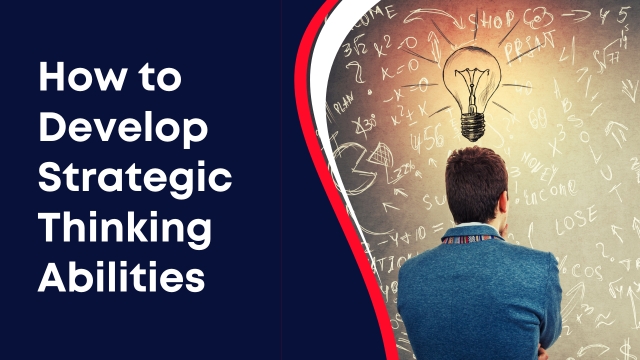Strategic thinking is a valuable skill in today’s fast-paced world. It involves planning, problem-solving, and making decisions that align with long-term goals. Developing strategic thinking abilities can benefit both your personal and professional life. This article will provide practical steps to help you enhance your strategic thinking skills.
Understand Strategic Thinking
Strategic thinking is analyzing situations, identifying opportunities, and making plans to achieve desired outcomes. It requires a combination of creativity, analytical skills, and foresight. Understanding what strategic thinking entails is the first step in developing these abilities. To think strategically, you must consider various viewpoints. This means being open to ideas and suggestions from others. Listening actively can help you see the bigger picture.
Set Clear Goals
Having clear goals is crucial for strategic thinking. Define what you want to achieve in both the short and long term. Goals give you direction and purpose. To set practical goals, use the SMART framework:
- Specific: Clearly define what you want to achieve.
- Measurable: Establish criteria to track your progress.
- Achievable: Ensure your goals are realistic and attainable.
- Relevant: Align your goals with your broader objectives.
- Time-bound: Set deadlines for achieving your goals.
Gather Relevant Information
To make informed decisions, gather information related to your goals. This includes market research, industry trends, and competitor analysis. The more information you have, the better equipped you will be to think strategically. Seek information from various sources. Read articles, attend workshops, and network with professionals in your field. Different perspectives can provide valuable insights.
Analyze the Situation
Once you have gathered information, analyze the situation. Identify strengths, weaknesses, opportunities, and threats (SWOT analysis). This framework helps you understand where you stand and what challenges you might face. To perform a SWOT analysis, create a four-box grid:
- Strengths: What are your advantages?
- Weaknesses: Where do you need improvement?
- Opportunities: What external factors can you leverage?
- Threats: What obstacles could hinder your progress?
Encourage Creative Thinking
Strategic thinking requires creativity. Brainstorming new ideas can lead to innovative solutions. Encourage creative thinking in yourself and your team. Try techniques like mind mapping or free writing. These methods can help generate fresh ideas. Set aside time for brainstorming sessions to foster creativity.
Develop Problem-Solving Skills
Strategic thinking often involves solving complex problems. Strengthening your problem-solving skills will enhance your ability to think strategically. Use a structured approach to tackle problems:
- Identify the problem: Clearly define the issue.
- Gather information: Collect data relevant to the problem.
- Generate solutions: Brainstorm possible solutions.
- Evaluate options: Weigh the pros and cons of each option.
- Implement a solution: Choose the best option and put it into action.
- Review the results: Assess the effectiveness of the solution.
Foster a Strategic Mindset
Developing a strategic mindset is key to thinking strategically. This mindset involves being proactive, open to change, and willing to learn from experiences. Take time to reflect on your past decisions and experiences. Consider what worked well and what didn’t. Learning from both successes and failures can improve your strategic thinking skills.
Collaborate with Others
Working with others can enhance your strategic thinking. Collaboration allows you to combine different ideas and perspectives. It also helps in building relationships and networks. Participate in team meetings and discussions. Share your ideas and listen to others. Collaborative environments can spark innovative solutions and enhance strategic thinking.
Seek Feedback
Feedback is essential for growth. Ask for feedback from peers, mentors, or supervisors. Constructive criticism can provide insights into your strategic thinking abilities. Approach feedback with an open mind. Use it as a tool for improvement. Making adjustments based on feedback can enhance your strategic thinking skills over time.
Practice Decision-Making
Strategic thinking involves making decisions. Practice decision-making regularly to improve this skill. Consider the potential outcomes of your choices. Create hypothetical scenarios and think through the decisions you would make. Evaluate the possible consequences of each option. This practice can enhance your decision-making abilities.
Develop a Long-Term Vision
Strategic thinking requires a long-term perspective. Develop a vision for where you want to be in the future. This vision will guide your decisions and actions. Write a clear vision statement that encapsulates your goals and aspirations. Refer to this statement when making decisions to ensure alignment with your long-term objectives.
Conclusion
Developing strategic thinking abilities takes time and practice. You can enhance your skills by understanding the concept, setting clear goals, gathering information, and analyzing situations. Encourage creativity, collaborate with others, and seek feedback to improve further. Stay informed about industry trends and practice decision-making regularly. With dedication and effort, you can become a strategic thinker, capable of navigating challenges and seizing opportunities effectively.




